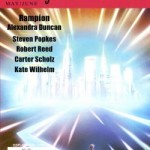The Mystery Woman
It was a different world, then, you see. 
Those of you under 25 won’t be old enough to remember much about life before the internet, when Facebook didn’t rule the world, and writers didn’t spend almost as much time social networking as actually writing books. It must seem as quaint as brogues and Sunday school.
In those days readers had to wait months, even years for their favourite author’s latest book to reach them. What else they got to read of those authors was an ocassional interview in a magazine, perhaps -if you were Isaac Asimov or Frederik Pohl- there would be an autobiography, written long after the event. Everything else had to be decoded from the actual stories. With the exception of Harlan Ellison, of course, who lived life as if he was on the internet long before it was invented.
It made the writers mysterious. What were they like, those men and women, who SF back in the early to mid 1970s? The most readers could hope for was a specially written afterword or introduction, which we pored over for clues. Of course, nowadays such reclusiveness is all but impossible.
Unless your name is Kate Wilhelm, of course. It’s ironic that I should know so little about someone I’ve been reading for over 35 years, especially since her memoir/ writing manual, Storyteller won her a second Hugo in 2005, and she’s taught dozens, perhaps hundreds of writers at Clarion for over 30 years. But that’s the way she seems to be — even in the case of Storyteller, the book was as much about others as herself.
When I first encountered her in 1975, I wasn’t that impressed. “Whatever Happened to the Olmecs?” didn’t have any of the flashiness of a Zelazny or a Delany. Indeed, it barely seemed to my unsubtle teenage self to be SF at all.
But year by year my knowledge and appreciation grew. I won’t list the award winners or the Best Of appearances; you can read them for yourselves. Welcome, Chaos won me over, and “Forever Yours, Anna” made me a fan – it should have won a Hugo to go with the Nebula, but the best stories don’t always win.
For the last twenty-five years she’s been writing mystery novels rather than SF, but many of those mystery stories were leavened with the fantastic, although equally as many weren’t. Be it SF or mystery, all her novels are character-oriented and shine with a beautiful prose style.
I’d been thinking about her more and more over the last couple of weeks, with her recent appearances in The Magazine of Fantasy & Science Fiction,  and the realization that she’s mastered not one but two genres with equal aplomb, and my two favourites at that. Because she’s lauded for her SF, but reading Skeletons today, I realized what an impressive writer she is.
and the realization that she’s mastered not one but two genres with equal aplomb, and my two favourites at that. Because she’s lauded for her SF, but reading Skeletons today, I realized what an impressive writer she is.
Reading PD James, for example, a teenager in one of her books talks as if they’re ninety, because James can’t capture the voice of anyone but her own generation. Similarly, all Ruth Rendell’s novels, for all their quality, have that same pedantic, slightly prissy voice. But Lee, the protagonist of Skeletons sounds exactly like a twenty-five year old, caught up in something innocuous, which escalates inexorably into a political thriller.
Perhaps it was cutting through the clutter of some of the Transtories submissions* this week, and then reading the stories in A Flush of Shadows so soon afterwards that rammed home to me that there’s not a word wasted in her prose:
They walked on the hard-packed wet sand at the edge of the water. Lime green waves rose knee-high before they lost themselves in the froth. Flocks of sandpipers probed the sand, scattered at their approach, settled again as soon as they passed. (“With Thimbles, With Forks, and Hope)
* Which is not to denigate those contributors; I’m sure that when they have over fifty years experience, their prose will be as effective.
Not a word out of place, not a spare adverb or pronoun. Perhaps I should follow her example, and bid you farewell, until the next time you stop by.
